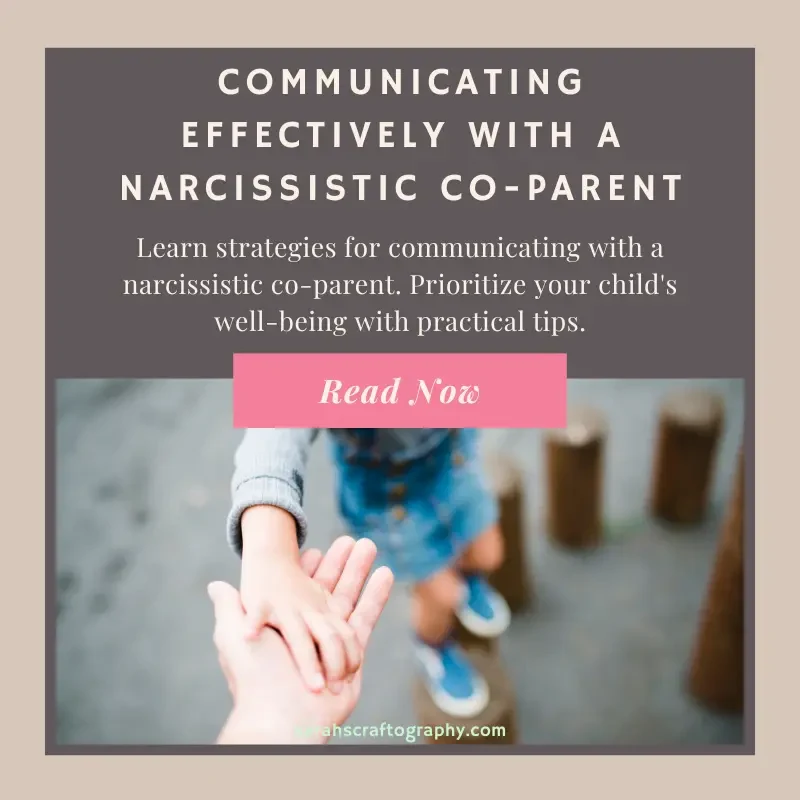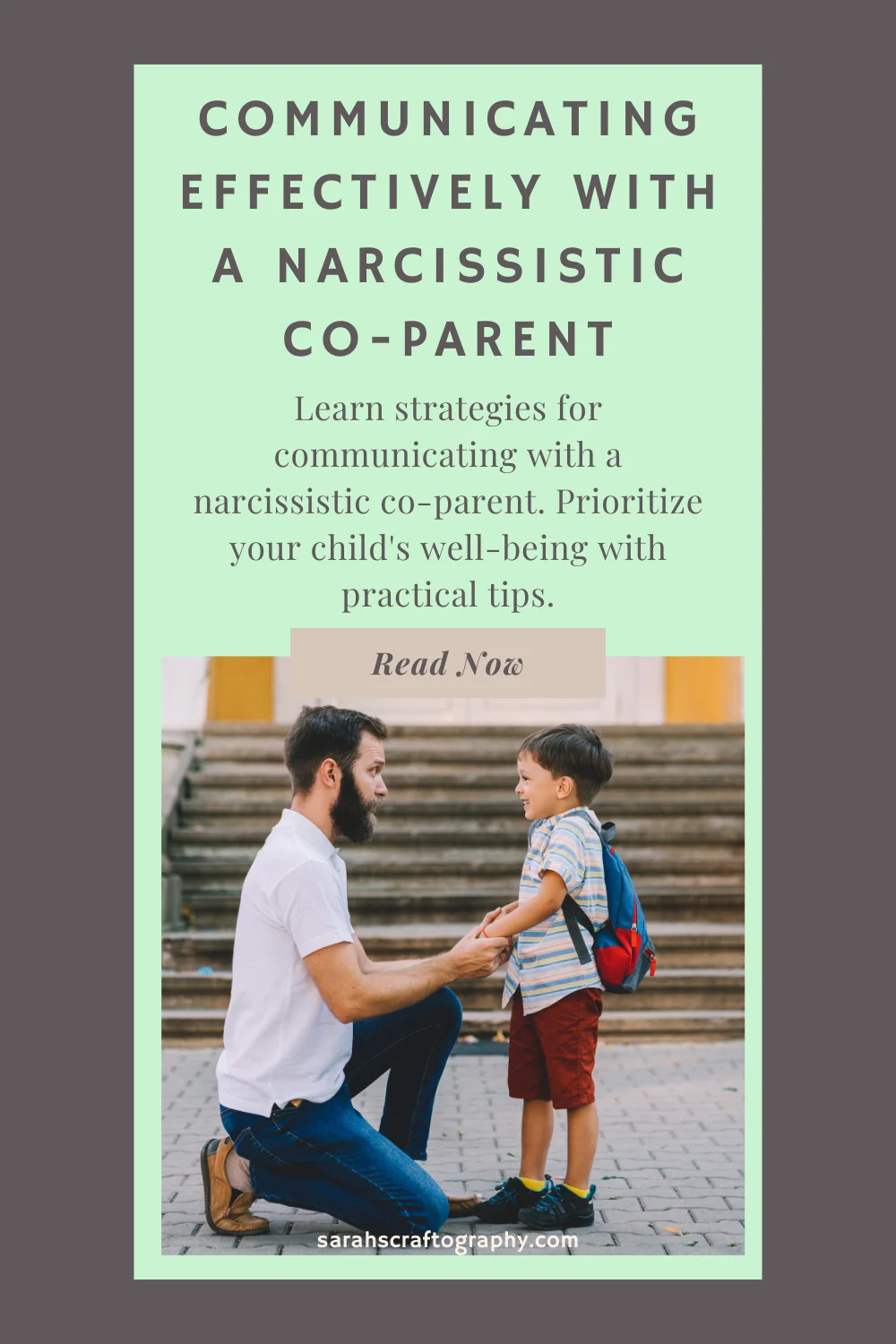Have you ever wondered why communicating with a narcissistic co-parent feels like an uphill battle?
Navigating co-parenting is tough enough, but adding a narcissist into the mix can turn it into a nightmare.
I’ve been there, grappling with the emotional rollercoaster of trying to maintain a peaceful environment for my child while dealing with constant manipulation and drama.
It's a journey filled with unexpected challenges and frustrating roadblocks.
But amidst the chaos, there are strategies that can help you regain control and ensure a stable, loving environment for your child.
In this post, I'll share practical tips and personal insights on how to effectively communicate with a narcissistic co-parent.
From setting firm boundaries to seeking professional support, we'll explore ways to protect your peace and prioritize your child's well-being.
Let's dive in and tackle this complex issue together, one step at a time.
Recognizing Key Narcissistic Behaviors and Traits
Communicating with a narcissistic co-parent can feel like an uphill battle.
Narcissism makes things much harder, making compromise and cooperation challenging.
Recognizing these traits is the first step towards managing the situation better.
Narcissists have an inflated sense of self-importance.
They believe they're better than others, which affects every co-parenting interaction.
They insist their way is best, dismissing your input as irrelevant.
For example, they might disregard your suggestions about your child's school or activities, insisting that only their ideas are valid.
Narcissists also lack empathy.
They don't mind rearranging plans last minute or undermining your role as a parent if it serves their interests.
You might experience them changing a carefully planned weekend without warning or consideration for how it affects you and your child.
Furthermore, narcissists crave constant praise and validation.
Even small accomplishments are shown off as big deals.
They feed off the applause, ignoring how their behavior impacts your child or the co-parenting relationship.
For instance, they might exaggerate their achievements at work to gain admiration, overshadowing your child's accomplishments.
When challenged, manipulation and control become their go-to strategies.
They twist facts, gaslight, and make you second-guess your decisions.
You might find them altering stories or details to maintain control, making you feel confused or doubting your own memory.
Understanding these traits gives you a map of the minefield.
The better you understand their nature, the better prepared you'll be to handle the chaos they bring.
Communicating effectively requires patience, strategic planning, and a firm grasp of these dynamics.
Recognizing the patterns can help you protect your well-being and maintain a stable environment for your child.
Establishing Clear Boundaries for Communication
Setting clear and firm boundaries is crucial when co-parenting with a narcissist.
These boundaries are lifelines for your sanity and your child's stability.
Start by deciding what's acceptable and what's not.
For example, pick-up and drop-off times should be precise and written down.
If the schedule says 5:00 PM, then it’s 5:00 PM, not whenever they feel like it.
This helps create consistency and prevents arguments about timing.
Narcissists often push, bend, and break these boundaries, testing your limits with last-minute changes or sneaky demands.
When this happens, you need to reinforce those boundaries consistently.
For instance, if they try to change your weekend plans at the last minute, remind them of the agreed schedule to avoid confusion and maintain stability.
Limiting communication can be a game-changer.
Stick to emails or co-parenting apps that provide a buffer and keep everything documented.
Apps like AppClose help keep communication clear and professional, reducing emotional strain.
This tools ensure that all interactions are recorded, which can be useful if disputes arise.
Be as detailed as possible in your agreements.
If anything is left vague, the narcissist will exploit it.
Cover every aspect of shared parenting responsibilities to close any loopholes.
For example, specify who is responsible for school drop-offs and pick-ups, extracurricular activities, and holiday plans to avoid misunderstandings.
Emotional boundaries are equally important.
Keep your responses short, to the point, and free of emotional content.
Replies like "Noted" or "I'll get back to you" work wonders, minimizing drama.
When they lash out, stay calm.
Responding with neutral language protects your peace of mind and sets an example for your child. Simple responses help avoid escalating conflicts.
Consistently reinforcing your boundaries is tiring but essential.
Each firm stance and every documented interaction are steps toward stability for you and your child.
Communicating effectively, even with a narcissistic co-parent, requires patience and persistence.
Remember, these boundaries are there to protect you and ensure a stable environment for your child.
Mastering Communication with a Narcissistic Co-Parent
Communicating effectively with a narcissistic co-parent requires savvy techniques to avoid chaos.
Here's how I navigate this challenging terrain:
Use Neutral Language
Using neutral language is your secret weapon.
Stick to clear, non-accusatory statements devoid of emotional undertones.
Instead of saying, "You never pick up Timmy on time," I say, "I noticed that Timmy was picked up 30 minutes late three times last month."
This approach helps keep the conversation factual and less confrontational.
Keep Interactions Brief and Factual
Keep interactions brief and factual.
Respond only to necessary points and keep replies short.
Simple responses like "Noted," "Understood," or "I'll check Timmy's schedule and get back to you" can shut down potential tirades before they start.
These brief replies minimize drama and keep communication focused on the child.
Avoid Emotional Arguments
Avoid emotional arguments.
Narcissists thrive on chaos, so the more emotional you get, the more fuel you give them.
I remind myself to take a deep breath, stick to neutral statements, and step away if needed.
Staying calm and composed is crucial.
Rely on Written Communication
Written communication creates a record of every interaction.
Emails and texts provide a paper trail that can be invaluable if matters escalate.
Co-parenting apps like App Close streamline communication and document everything.
These tools help keep interactions clear and professional, reducing the chance for manipulation.
Limit Communication Channels
Limiting communication channels minimizes misunderstandings and keeps things organized.
By consolidating everything through one app, it becomes harder for the narcissist to twist narratives.
This approach keeps everything in one place, making it easier to manage.
Choose When Not to Respond
Sometimes, the best response is no response.
Not every jab or complaint warrants a reply.
Choosing peace by letting non-essential comments slide can help maintain your sanity.
It’s important to pick your battles wisely.
Maintain Consistency
Consistency is key.
Calm, consistent responses over time help establish a new norm.
Stick to your strategies, communicate clearly, document everything, and always aim to de-escalate conflicts.
Over time, this consistency will help create a more stable co-parenting environment.
The art of communicating with a narcissistic co-parent involves neutrality, brevity, and written documentation.
With a reliable co-parenting app and consistent strategies, you can handle the challenges with grace.
Navigating Legal and Court Considerations
When dealing with a narcissistic co-parent, it's not just an emotional battle—it's also a legal one.
Creating a detailed legal parenting plan is crucial.
This plan should cover everything from financial responsibilities to visitation schedules and communication protocols.
Having a comprehensive plan in writing creates a formal, enforceable framework that leaves little room for manipulation.
Creating a Detailed Parenting Plan
Having a clear, detailed parenting plan is essential.
This plan should include exact times for pick-ups and drop-offs, financial responsibilities, and communication protocols.
For example, specifying that pick-ups and drop-offs occur at 5:00 PM sharp can prevent any ambiguity and manipulation.
Utilizing Court Services
Utilizing court services can also help.
A Guardian ad litem (GAL), a court-appointed advocate who represents the best interests of your child, can provide unbiased recommendations to the court.
Mediators can guide both parties to reach an amicable agreement, which is especially helpful when direct communication with a narcissist is challenging.
These professionals can offer support and ensure that the child's best interests are the focus.
Importance of Documentation
Documentation is key.
Carefully log every interaction with your narcissistic co-parent, including pick-ups, drop-offs, conversations, and emails.
These records can serve as essential evidence if you end up in court, illustrating any patterns of behavior that work against your child's best interest.
For example, keeping a journal of all interactions helps maintain a clear record of events.
Presenting Yourself in Court
When presenting yourself in court, remain composed, respectful, and factual.
Avoid getting drawn into emotional theatrics.
Use "I" statements to align your arguments with your child's best interests, and let the documented evidence speak for itself.
Dressing formally and comfortably presents you as a responsible and reliable parent.
Focus on being calm and clear to help the judge see your commitment to your child's well-being.
Post-Court Vigilance
Even after court, stay vigilant.
Reinforce court orders, continue documenting, and consult your attorney regularly to stay updated on any legal changes or new strategies.
This ongoing vigilance helps maintain a stable environment for your child, despite any continuing challenges.
Communicating effectively with a narcissistic co-parent involves both emotional and legal strategies.
By creating detailed plans, utilizing court services, documenting interactions, and presenting yourself well in court, you can navigate these difficult waters and protect your child's best interests.
Ensuring Your Child's Well-being
Supporting your child while co-parenting with a narcissist is challenging but essential.
Here are some strategies that have helped me navigate this complex situation:
Keep Explanations Age-Appropriate
When explaining the situation to your child, keep it age-appropriate.
For younger kids, simple statements like "Mommy and Daddy see things differently and both love you, but sometimes we don't agree" can suffice.
Avoid vilifying the other parent and focus on facts, not feelings.
This approach helps maintain your child's trust and keeps them from feeling caught in the middle.
Validate Their Feelings
Validate your child's feelings when they come to you upset.
Reassure them that their emotions are valid, helping them feel seen and heard.
For example, if your child says, "I'm sad because Dad didn't come to my game," you might respond, "I understand why you're sad. It's okay to feel that way."
Maintain Consistency
Maintain consistency in your parenting style.
Predictable routines, unwavering love, and clear consequences provide a sense of security for your child.
A stable environment helps them feel safe amidst the chaos.
For instance, always having dinner together at the same time can be a comforting routine.
Model Empathy
Model empathy by actively listening and sharing your own emotions in a healthy way.
This teaches your child how to manage feelings positively.
You might say, "I felt frustrated today too, but talking about it helped me feel better."
Seek Professional Help
Seek professional help when needed.
A child therapist or counselor can provide a safe space for your child to express their feelings and offer tools to navigate this complex relationship.
Professional support can be invaluable in helping your child cope with the emotional strain.
Keep Open Communication
Keep open and honest communication with your child.
Practice active listening and problem-solving together.
Encourage them to share their thoughts and feelings without fear of judgment.
This openness helps build a strong, trusting relationship.
Reinforce Normalcy and Control
Reinforce their sense of normalcy and control by allowing them to make age-appropriate choices in a stable environment.
Simple choices like picking their clothes or choosing a weekend activity can empower them and provide a sense of control.
Practice Self-Care
Remember, self-care isn't selfish.
Taking care of yourself enables you to be a stronger, more grounded parent for your child.
Whether it's taking a walk, reading a book, or talking to a friend, self-care helps you stay resilient and present for your child.
Supporting your child through co-parenting with a narcissist is challenging but essential.
Keep explanations age-appropriate, maintain consistent routines, validate their feelings, and seek professional help when needed.
Stay emotionally present and be the loving, reliable anchor they can count on. You've got this, and so do they.
Communicating with a narcissistic co-parent is undeniably challenging, but with the right strategies, it is possible to create a more stable environment for your child.
Remember, keeping explanations age-appropriate, validating your child's feelings, and maintaining consistent routines are crucial steps.
Modeling empathy and seeking professional help when needed can provide additional support and stability.
Documentation and limiting communication channels help reduce misunderstandings and potential manipulations.
Consistency in your approach ensures that your child feels secure and loved, even in the midst of co-parenting conflicts.
As you navigate this difficult journey, remember to practice self-care.

Taking care of your own emotional and mental well-being allows you to be a stronger and more resilient parent.
Reflect on the lessons shared here and consider how you can apply them to your own situation.
Think about the specific challenges you face and how these strategies can help you overcome them.
Have you found ways to effectively communicate with your narcissistic co-parent?
What strategies have worked for you, and what new approaches are you willing to try?
Take action today by implementing one of the tips discussed in this post.
Whether it's creating a more detailed parenting plan or practicing active listening with your child, each step you take brings you closer to a more harmonious co-parenting relationship.
Communicating effectively with a narcissistic co-parent is a continuous process of learning and adaptation.
Stay committed to your child's well-being, and know that your efforts are making a positive difference.
Domestic Violence
How To Detect Elderly Abuse
Do you know an elderly person you think maybe experiencing elderly abuse? I have some ways to detect elderly abuse and get help for them.
How To Escape Your Abusive Relationship
Have you ever wondered how make an escape plan? I am a survivor of domestic violence, here's how to escape your abusive relationship.
Picking A Domestic Violence Shelter
Have you wondered if a domestic violence shelter is right for you? Here are some things you need to consider before making that choice.






















